Israel, Literature, 2016
Yitzhak
Laor

Though still relatively unknown in Germany, in his home country Yitzhak Laor is considered the bona fide enfant terrible of Israeli literature. There, the author and lyricist is known not only as his Israel’s most forceful writer, but also as its most vocal critic.
Yitzhak Laor was born and raised in a small village north of Hadera in 1948. Growing up, beauty and death, safety and violence went hand in hand, with settlers living in orderly homes on one side, and Holocaust survivors and recent immigrants from the Middle East making do in meager accommodations on the other. According to Yitzhak Laor, his relationship to the world has always been shaped by the violence that he witnessed on a daily basis. When called up to perform his military service in the occupied territories in 1972, he refused and was sent to prison for a few weeks – an unfortunate experience unique among Israeli writers. Beginning in the 1970s, he became well known for his poetry, later winning the Bernstein Poetry Prize in 1992. He began to write prose at the beginning of the 1990s, publishing his first novel, titled The People, Food Fit for a King, in 1993. Whether his medium is poetry or prose, one thing stands out: When it comes to the constitutive national myths and legends of his homeland, Yitzhak Laor has from the very beginning taken a no-holds-barred approach, always striving to scratch below the surface of Israel’s history and self-image. He accomplishes this in works that are imbued with an earthy sarcasm and have a gentle, melancholic sensibility. For example, the reader of his second novel, titled And with my Spirit, my Corpse (1998, German translation 2003), is quickly transported to a kind of hell. The book begins with a convoy of huge tanks travelling along Tel Aviv’s beach promenade on June 6, 1982. Thus began the Lebanon War, which Yitzhak Laor called “the quintessential march of stupidity.” The author, who founded a committee to protest the war, is sharply critical of this turning point in Israeli history.
In his novel, Yitzhak Laor finds a solution to the perennial narrative dilemma – how should we write about war? – with a narrative kaleidoscope composed of many voices and figures: with blunt, almost cinematic cuts and dispensing with any kind of chronology, he constructs a wild entity out of the stories. With sharp edges, the individual episodes accumulate, each one more grotesque, brutal, harsh, and filled with evil than the other. Lost in this kaleidoscope, readers quickly lose their footing – an effect intentionally created by the author: As he explains in the book’s commentary, “The feeling of being jerked around is not a narrative trick. Life itself is full of twists and turns, just like the brain or colon.” The kaleidoscope soon reveals a society erected on a foundation of violence so ubiquitous that it even extends into private relationships. The author satirizes this psychotic love of violence as well as the pathological identity fetish he believes Israel has succumbed to. For this reason, his characters always have multiple identities, and often do not even know whether the other is a brother, foe, or even a double of his own ego. Speaking – or even stammering – in many tongues and guises is more than just an aesthetic device for the author, who eschews utter realism; rather, it forms his literary resistance against his country’s need to speak with one voice, a country that lost its way amidst interpretive battles for complex national borders. The complex and, therefore, contradictory, reality of Israel also endows Yitzhak Laor’s third novel Ecce Homo (2002, German translation 2006) with its characteristic form: Once again, the novel’s artistry practically leaps off the page with its complex characters and multiple plots. An aging general provides the novel’s center of gravity; the most important strands of the plot revolve around his love affairs and war activities. In the novel’s dramatic scenes, the author mercilessly reveals how ludicrous he finds the powers that be in his home country – from the military, to the political elite, to anyone wielding power. He believes that the army is filled with “arrogant fat slobs,” while he wrote the following about Israel’s treatment of Palestinians: “What have we built here? A life, atop their blood.” Nevertheless, the novel never devolves into a simplistic black-and-white look at the situation; rather, Yiitzhak Laor knows how to differentiate between damages one brings upon oneself and those suffered unfairly at the hands of others; these damages are of course inflicted on everyone with a destiny tied to Israel’s. As in all of Yitzhak Laor’s prose, here he also uses an ambiguous, yet dialectical gesture to criticize his country’s focus on the Holocaust, which he deems excessive dwelling on suffering. And yet, in the novel the reader encounters a number of characters who are all damaged by overwhelming memories of the Holocaust that they either heard about or experienced themselves. Yitzhak Laor allows neither the reader nor the characters to break free from this chasm – between the ineluctable tension between a person’s own history, and “History” with a capital “H.” That’s why his novels always close with open-ended imagery to vividly demonstrate the vulnerability of the living. According to the critic Sigrid Brinkmann, the open-ended quality of his work points to a deeper political meaning, because no one in them remains innocent (in: Der Freitag, 2.10.2006). In her conclusion, she writes that Yitzhak Laor’s work “is beyond compare in contemporary Israeli literature” for the way that it “seamlessly blends the political with the poetic” (in: Der Freitag, 2.10.2006).
Text: Claudia Kramatschek
Translation: Amy Pradell
Steine, Gitter, Stimmen. Roman. Translation: Markus Lemke. Unionsverlag. Zurich 2003.
Ecce homo. Roman. Translation: Markus Lemke. Unionsverlag. Zurich 2006.
Past
-

Auf dieser Erde, die in Schönheit gehüllt ist und Wörtern misstraut
Yitzhak Laor2017, Book (Spurensicherung Bd. 30)

Order: info@matthes-seitz-berlin.de




